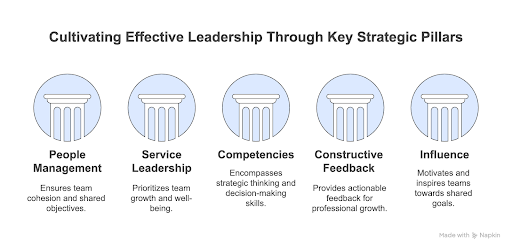8 Leadership Qualities of a Good Leader
Is it their skills, their experience, or their vision for the future?

Qualities of a Good Leader That You Can Embrace Today
What do you look for in someone you respect as a leader? While everyone's answer might vary, we can all agree that good and effective leadership is important in any workplace.
Without good leadership, even the most talented people can have a hard time feeling motivated. That's why, if you're serious about stepping into leadership or becoming a more influential figure, understanding how to build key leadership skills and develop essential leadership qualities isn't just beneficial—it's absolutely crucial for your own journey.
Join us as we uncover:
What Makes a Good Leader
Why Leadership Matters in the Workplace
Key Qualities of a Good Leader in the Workplace
Aspects of Effective Leadership
How to Improve Leadership Skills in the Workplace
What Makes Good Leadership and a Good Leader?
Pinpointing one simple definition of good leadership is trickier than it sounds. Every leader leads in their own unique ways. But all good leaders have a good mix of qualities they're born with and skills they learn, which helps them encourage, affect, and direct other people.
Let's dig deeper into what makes someone a strong leader and how their qualities can help both individuals and organisations succeed.
Leadership Qualities vs. Leadership Skills
Knowing the difference between leadership qualities and leadership skills is helpful. Leadership qualities are the natural traits a person brings to the table, like being honest, caring, and the ability to bounce back from setbacks. These qualities shape how they lead and help them connect with their team.
Leadership skills, on the other hand, are things you can learn to do, like communicating clearly, delegating tasks to others effectively, and solving disagreements. You can get better at these skills by practising, getting training, and from your own experiences.
For example, when a leader actively uses empathy (a quality), they listen more effectively (a skill), allowing them to better understand and respond to what their team needs and cares about.
Leadership vs Management
Even though people sometimes use the words interchangeably, leadership and management are actually quite different.
Management is mostly about planning, setting things up, and keeping control of what a company has, like its workers, money, and schedules, to reach certain goals. But leading is about encouraging and affecting people to work together towards a common goal, pushing them to do more than what they have to.
For example, a manager might make sure a project stays within its budget and gets finished on time, while a leader will give the team energy to deal with problems, come up with new ideas, and make them feel like they all own the project together. And it's important to know that anyone at any level in a company can be a leader, not just those with a “manager” in their job title.
Good Leadership in Action
Imagine a situation at work where a project suddenly falls behind schedule and has big technical problems. Instead of panicking, a good leader would step in and be transparent with the team, openly sharing what's happening. They'd actively listen to everyone's concerns, really trying to understand the different viewpoints, before taking the next steps to best tackle the issue.
Take Mary Barra, the CEO of General Motors, for example. The core of her management style is guided by transparency, inclusivity and accountability. In such a scenario, she wouldn’t just dictate solutions; she’d work with her team to brainstorm new approaches and figure out how to get back on track, before clearly defining next steps and expectations. Throughout this, she’d also be a source of encouragement, keeping the team motivated and focused on crossing the finish line. This blend of open communication, collaborative problem-solving, and genuine support is a hallmark of effective leadership.
Leadership in Today’s Workplace: Why It Matters
In a fast-changing world, we can’t afford to overlook the power of good leadership. With new technology, global business, and things getting more complicated, workplaces today need to be able to change easily, come up with new ideas, and work well together.
That's why the ability to inspire, motivate, and guide teams effectively is one of the in-demand skills. When the people in charge possess all the qualities of effective leaders, organisations can better navigate challenges, foster innovation, and achieve their goals.

Qualities of Good Leadership in the Workplace
Here are some of the most common and important qualities you can actively cultivate on your journey to becoming a good leader, qualities that stand true across any role or industry:
1. Communication and Active Listening
Effective communication is key to being a good leader. According to a study by the Harvard Business Review, managers who are perceived as good listeners are rated as 37% more effective in their roles.
Leaders need to be able to explain their ideas clearly, give helpful advice, and talk openly with their team. Active listening is equally important as it allows leaders to understand their team's perspectives, build rapport, and foster a sense of being heard and valued.
2. Honesty and Integrity
Leaders need to be truthful and do the right thing. When you're honest, people trust you, making people feel confident in following your lead and embracing your direction. For example, if a leader says they made a mistake and takes responsibility, it shows they're honest and have integrity, which makes the team more open and truthful too.
3. Accountability
Good leaders hold themselves and their team accountable. According to a report by the Harvard Business Review, 91% of employees say that “effectively holding others accountable” is one of their company’s top leadership development needs.
Leaders will set clear expectations, monitor progress, and address issues promptly and fairly to ensure that everyone is working towards shared goals.
4. Strategic and Forward-Thinking
Leaders must be able to anticipate future trends, identify opportunities, and develop plans to achieve long-term goals. For example, a leader in a tech company might anticipate the rise of AI and develop a strategy to integrate it.
Strategic and forward-thinking are important leadership skills that usually rely on one’s experience and in-depth knowledge of the industry and business landscape. While this level of expertise might not be expected from everyone at the start of their career, it can be developed over time through learning and experience.
5. Empathy and Fairness
Empathetic and fair leaders create a supportive environment where everyone feels valued. A 2021 survey by the Global Leadership Forecast found that empathy is a top skill for leaders.
When managers focus on these key qualities of a good leader, you'll often see teams working together better, sharing ideas more, feeling happier at work, and staying with the company longer.
6. Empowerment
The same 2021 survey by Global Leadership Forecast mentioned above found that delegation was rated as the second most important skill behind empathy in mitigating employee burnout. That’s why good leaders must know how to trust their team and give them what is needed to do their jobs by assigning tasks in the right way. This delegation then helps everyone get more done and ensures that everyone can perform at their best.
7. Resilience
Good leaders need to be able to get back on their feet after things go wrong and learn from their errors. For instance, a leader might learn from a project that didn't work out and use that knowledge to make the next project better.
8. Confidence and Self-Awareness
Leaders need confidence to inspire trust and motivate others. A Forbes study on confidence in leaders showed that self-confidence has a positive influence on some behaviours; leaders with higher self-confidence were rated significantly more positively on a list of leadership traits.
However, when high confidence becomes overconfidence, it may result in arrogance, damaged relationships, a lack of trust within the team, or even dishonesty. That's why self-awareness is a crucial quality of effective leadership for confident leaders.
Aspects of Good and Effective Leadership

Now that we have explored the qualities of a good leader and good leadership skills, let's look at how these translate into effective leadership in real life:
People Management
People management involves overseeing and guiding a team of individuals to achieve its collective goals. It's helpful because it ensures that everyone is working effectively towards shared objectives and that individuals are supported in their roles.
Good people management also builds a friendly and effective workplace because it makes people feel like they belong, lets everyone talk openly, and gets them to work together.
Service Leadership
Service leadership prioritises the needs, growth, and well-being of team members. Leaders who can genuinely listen to and understand their team's concerns can build trust and loyalty with their team members as they demonstrate care and respect.
Service leadership also helps people do their best and creates a workplace where everyone works together and supports each other. This way of leading, which is a big part of what makes a good leader, often makes workers more interested in their jobs and happier, which, in the end, helps the company get more done and do better overall.
Competencies
Leadership competencies are the specific skills and abilities that help leaders do their jobs well. Key competencies include strategic thinking, decision-making, problem-solving, and communication. Leaders need to build these skills because they're the basic tools for leading well in all kinds of situations.
Ability to Give Constructive Feedback and Conflict Management
A good leader should be able to offer specific, actionable, and balanced feedback to team members about their performance, with the goal of helping them improve and grow professionally. This skill comes from being empathetic, as it requires understanding the impact of feedback on the individual and delivering it in a supportive and encouraging manner.
Similarly, it's important for a leader to know how to solve problems and arguments in the team in a way that's fair, respectful, and gets things done so everyone feels good about working together. This also draws on empathy, as effective conflict resolution requires understanding different perspectives and finding solutions that address the needs of all parties involved.
Ability to Influence Others
The ability to influence others is a key quality of good and effective leadership. It's helpful because it enables leaders to persuade, inspire, and motivate individuals and teams to support their vision and work collaboratively towards shared goals.
Aside from motivating individuals to complete projects and tasks effectively, effective influence is important for driving change and achieving organisational success. In the long run, it also fosters a culture of shared purpose and commitment, which is essential for sustained growth and innovation.
How to Develop and Improve Leadership Skills for the Workplace?
Maybe the biggest question for individuals at all levels within an organisation, from those just starting out to those who've been leading for years, is how to build leadership skills and, more precisely, how to be a good leader at work to get better at their job. Here's how you can start working on becoming a better leader:
Set Leadership Development Goals
Setting specific, measurable, achievable, relevant, and time-bound (SMART) leadership development goals allows you to have a clear direction and focus, ensuring you're working towards tangible and meaningful improvements.
These goals should align with your overall career aspirations, the needs of your organisation, and the specific leadership skills you wish to enhance. For example, if you want to improve your communication skills, you could set a goal to actively participate in communication skills workshops and practise active listening techniques in team meetings, tracking your progress over a defined period.
Self-Assess and Identify Your Leadership Style
Self-assessment is crucial for understanding how to be a good team leader. Knowing what you're good at, what you're not so good at, what's important to you, and how you like to lead gives you a good starting point for working on becoming a better leader.
There are various leadership styles, each with its own advantages and disadvantages. The best leaders often change their style depending on the situation and who they're leading. Some common ways of leading are:
People-First and Service Leadership: Emphasises empathy, support, and prioritising the needs of team members.
Transformational Leadership: Inspires and motivates followers to achieve extraordinary outcomes.
Democratic (Participative) Leadership: Involves team members in decision-making processes.
Coaching-Style Leadership: Focuses on developing individual skills and potential.
Laissez-Faire Leadership: Provides autonomy and minimal supervision.
Situational Leadership: Adapts leadership style based on the situation and team member readiness.
Knowing what you're naturally good at as a leader helps you use those strengths, see what you need to work on, and change your leadership style to be as effective as possible.
Seek Feedback and Mentorship
When people give you helpful criticism, it can show you how you talk to others, how you make choices, and how you lead in general. So, it's a good idea to ask for advice and direction from the people you work with, your boss, and experienced leaders who can guide you.
Go for Leadership Courses to Upgrade
Many institutions and organisations offer specialised courses to enhance specific leadership skills, such as communication, delegation, conflict management, strategic thinking, and emotional intelligence. These courses can provide you with new knowledge, practical tools, and opportunities to practise your skills in a safe and supportive environment.
Real Workplace Experiences
Real-world experiences offer valuable opportunities to hone your leadership abilities. Throughout your career, you'll witness examples of good and bad leadership. Good leadership can really change things at any job, turning a messy or ineffective workplace into a place where everyone does well and feels satisfied. Take, for example, a team that's short on time, has too many things to do at once, and where people are unhappy and not talking to each other well.
With good leadership skills, the team would feel supported, encouraged, and able to work together. The leader would make sure everyone talks openly and clearly, solves problems quickly, and ensures everyone's working towards the same goal and feels like they're all in it together. They would also praise people for what they do and create a friendly and collaborative atmosphere.
But if a team has poor leadership, people might be confused, frustrated, and down. The leader might not be able to make up their mind, might try to control everyone too much, or might not give clear instructions. This can make people less productive, more stressed, and more likely to quit. This lack of leadership skills can also make the workplace stressful and eventually hurt the company.
Cultivate the Qualities of a Good Leader
Becoming a good leader isn’t about having a fancy title— it’s about building trust, motivating others, and making a positive impact through both your words and actions. Whether you're an aspiring leader or someone already managing a team, embracing and cultivating the key qualities of a good leader can help you grow, support others more effectively, and achieve better outcomes together. Speak to our Skills Ambassadors today to find out how you can cultivate better leadership skills.
Posted on 8/6/2025 12:00:00 AM